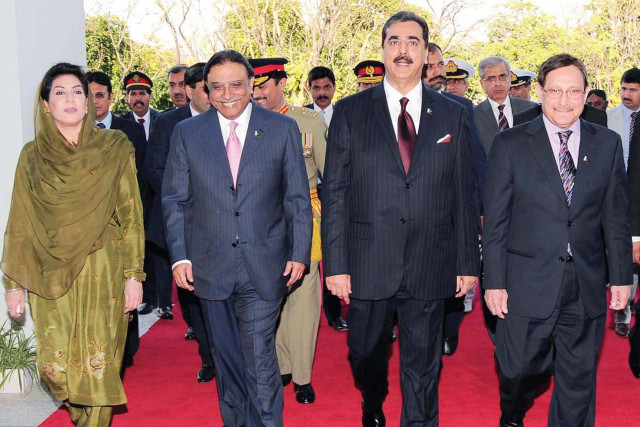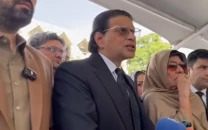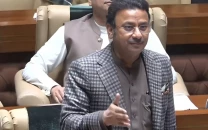Nobody allowed to usurp parliament’s powers: Zardari
Boycott allows smooth speech; President sends dialogue overture to opposition in bid to forge national consensus.

Nobody allowed to usurp parliament’s powers: Zardari
President Asif Ali Zardari vowed to defend democracy and the powers of parliament in his address on Tuesday to the joint sitting of the National Assembly and Senate, which passed off without disruption thanks to a half-hearted boycott by the disjointed opposition.
“We will not permit anyone to usurp the powers that rightly belong to parliament. We believe that all state organs should work within their parameters as laid down in the Constitution,” Zardari said, as he became the first elected president to address parliament for four consecutive years.
“Let us strive to keep our egos aside. Let political forces stop challenging each other merely for political point scoring. It will only weaken democracy in the long run,” Zardari said in words directed at his political opponents. The restoration of the 1973 Constitution, he said, showed what political forces could do if they rose above politicking.
The president spent most of his address trumpeting the achievements of his Pakistan Peoples Party government in the last three years. He also outlined his government’s plans for the rest of his tenure.
The president is required by the constitution to address a joint sitting of the National Assembly and Senate at the start of each parliamentary year. Former president Pervez Musharraf managed it once, in 2004, in the five-year term of the last government.
Opposition disarray
The prospect of a speech disrupted by shouts from the opposition benches dissipated at the onset when the biggest opposition party, the Pakistan Muslim League-Nawaz, walked out of the house along with the Jamiat Ulema-i-Islam and the two members of the PPP-Sherpao in a token protest at the speaker’s refusal to allow the opposition leader to speak on a point of order before the president’s address.
The Pakistan Muslim League-Quaid later walked out separately, though around half a dozen of its members remained inside the house, indicating further divisions within the former ruling party that had already split into two major factions. PML-Q parliamentary leader Syed Faisal Saleh Hayat was angry with his party leader Chaudhry Shujaat Hussain for not taking him into confidence on the party’s strategy for the joint session.
Before the start, Opposition Leader Chaudhry Nisar Ali Khan had approached the PML-Q through Riaz Pirzada, suggesting they adopt a joint strategy. The latter declined, saying the PML-Q wanted to maintain its own identity as an opposition party.
Some PPP ministers accosted opposition members and urged them to return to the house. In closed-door negotiations, sources said, the Chaudhrys of Gujrat at one point agreed to return to the house, but changed their minds in the face of strong resistance from party members.
Fight against extremism
In his speech, Zardari paid tribute to the security forces and citizens who had been killed in fighting militancy and extremism. He also condemned the murders of Punjab governor Salmaan Taseer and federal minister Shahbaz Bhatti. Neither of the two houses of parliament has adopted resolutions condemning their assassinations.
Zardari said the government would take action against all criminals in Karachi and promised to provide security to all citizens.
He congratulated the parliament for passing the 18th and 19th constitutional amendments last year, which had banished constitutional distortions perpetrated by successive military dictators.
Zardari said that when his party came to power in 2008, it inherited an ailing economy and rising militancy and extremism. He claimed that his government had made significant progress on these issues.
He said a UN inquiry into the assassination of Benazir Bhutto had been completed and a challan based on its report submitted before the trial court. He said the individuals involved in her killing would not escape punishment, but his government’s priority was to defeat the mindset that was behind her assassination.
He said a “full spectrum dialogue process” had been resumed with India. He reiterated Pakistan’s position on Kashmir, saying the government wanted a just settlement in accordance with UN resolutions and the aspirations of the people of Kashmir.
Zardari said Pakistan would not permit the use of its soil for terrorist activities against any other country.
He called on other parties to join the government in building a consensus on resolving national issues like the energy shortage, circular debt, taxation reform, restructuring of public sector entities, and documenting the economy.
Published in The Express Tribune, March 23rd, 2011.



















COMMENTS
Comments are moderated and generally will be posted if they are on-topic and not abusive.
For more information, please see our Comments FAQ